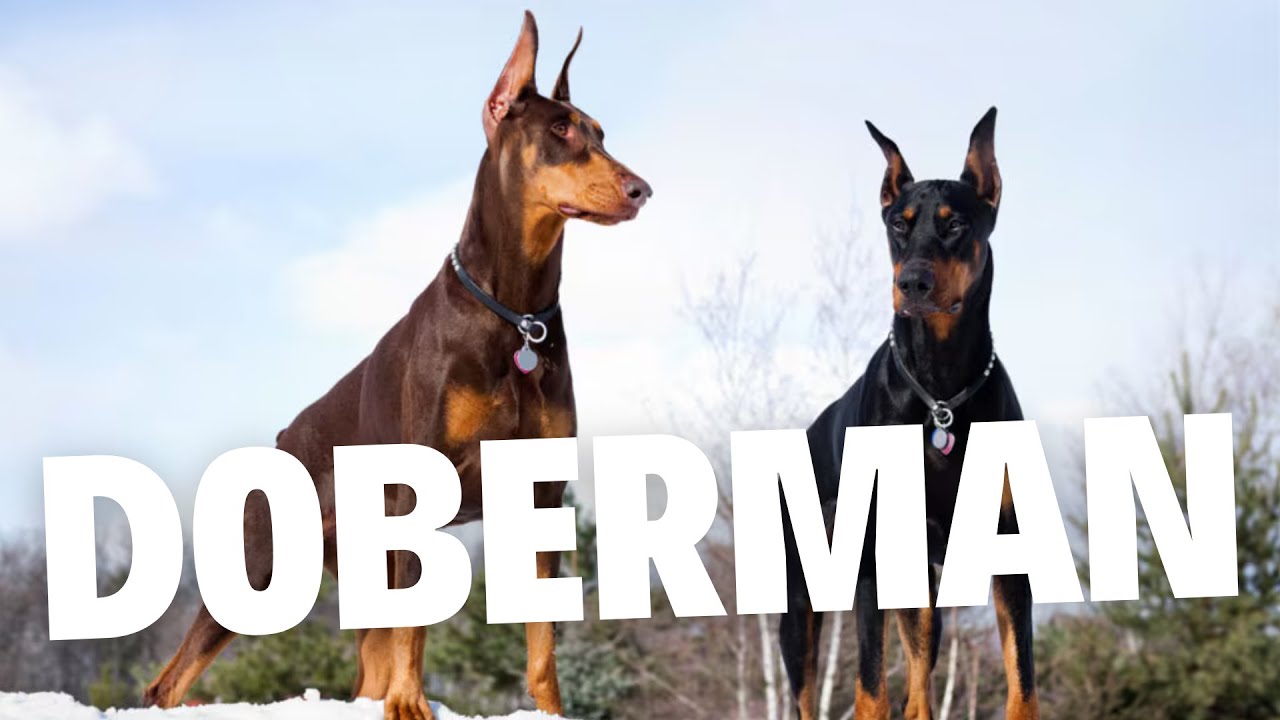The Ultimate Guide to the Doberman Pinscher: Complete Details, Training, Care, Pros and Cons, and Price
Introduction to the Doberman Pinscher
The Doberman Pinscher, often just called the Doberman, is one of the most iconic and recognizable dog breeds in the world. With a sleek, muscular build and a reputation for being a fearless protector, the Doberman is a dog that demands respect. This breed is known for its intelligence, loyalty, and work ethic. Initially bred as a guard dog, Dobermans are often used in law enforcement, military, and personal protection.
Despite their reputation for being aggressive or intimidating, Dobermans are also gentle, affectionate, and loyal to their families. They make excellent companions for experienced dog owners who can provide them with the exercise, training, and care they need. In this article, we will explore everything you need to know about the Doberman Pinscher, from choosing the right one, how to train and care for them, and their pros and cons, to the price of owning one.
History and Origins of the Doberman Pinscher
The Doberman Pinscher was developed by a German tax collector named Karl Friedrich Louis Dobermann in the late 19th century. Dobermann, who worked in dangerous areas, wanted a dog that would be both loyal and protective, but also agile and intelligent. He crossed various breeds to create the Doberman, including the Rottweiler, Greyhound, and Weimaraner.
The resulting dog was strong, protective, and highly trainable. Dobermans quickly gained popularity for their abilities as guard dogs and police dogs, and they are still often used in similar roles today. Over time, however, Dobermans have also become beloved family pets, prized for their loyalty and intelligence.
Physical Characteristics of the Doberman Pinscher
Size and Build
Dobermans are large, muscular dogs with a sleek, elegant appearance. They have an athletic build that allows them to be quick and agile, which is why they excel in various working roles. Here are the key physical traits:
- Height: 63-72 cm (25-28 inches)
- Weight: 32-45 kg (70-100 lbs)
- Coat: Short, smooth, and shiny
- Color: Black, blue, red, and fawn, with rust-colored markings
- Life Expectancy: 10-13 years
Temperament
Dobermans are known for their distinctive combination of loyalty, intelligence, and protective instincts. Here are some key behavioral characteristics:
- Loyal: Dobermans are deeply loyal to their families and can form strong bonds with their owners.
- Protective: They are naturally protective and make excellent guard dogs. They will not hesitate to defend their home and loved ones.
- Intelligent: Dobermans are one of the most intelligent dog breeds. They can learn commands quickly and excel in tasks that require thinking and problem-solving.
- Energetic: Being highly active, Dobermans need a lot of exercise. Without sufficient physical activity, they can become bored and potentially develop behavioral issues.
- Affectionate: Despite their reputation as tough dogs, Dobermans can be very affectionate and enjoy spending time with their families.
How to Choose a Doberman Pinscher
Choosing the right Doberman for you and your family is an important step in ensuring that you have a good experience as a dog owner. Here are some tips for selecting the right Doberman:
1. Find a Reputable Breeder
It’s essential to get your Doberman from a reputable breeder who prioritizes the health and well-being of their dogs. A responsible breeder will provide you with health clearances for the puppy’s parents, ensuring that the dog is free from genetic conditions like hip dysplasia, heart disease, or thyroid issues. Additionally, a reputable breeder will be knowledgeable about the breed and be able to provide guidance on the puppy’s temperament and care needs.
2. Health and Temperament
When choosing a Doberman, make sure to assess the puppy’s temperament. It should be curious, confident, and not overly shy or aggressive. Health is also a key factor—look for a puppy that has been raised in a clean, stimulating environment with proper veterinary care.
3. Age and Training
If you are looking for a puppy, be prepared to start from scratch with socialization and basic training. However, if you are looking to adopt an older Doberman, make sure to inquire about their history and training. Some older Dobermans may already have basic obedience and socialization skills, which can be a great advantage.
How to Train a Doberman Pinscher
Training a Doberman Pinscher requires consistency, patience, and positive reinforcement. Due to their high intelligence, Dobermans can pick up commands quickly, but they also need clear boundaries and strong leadership. Here’s how to train your Doberman effectively:
1. Start Early with Socialization
Socializing your Doberman from a young age is critical. Early exposure to different people, environments, and animals will help your dog become well-rounded and comfortable in various situations. A well-socialized Doberman will be less likely to display aggressive behaviors or become fearful in unfamiliar situations.
2. Use Positive Reinforcement
Dobermans respond best to positive reinforcement. Use treats, praise, and toys to reward good behavior. Harsh training methods, such as punishment or negative reinforcement, can cause fear or aggression, which can be detrimental to a Doberman’s temperament.
3. Be Consistent
Dobermans thrive on routine. Be consistent in your commands and expectations, and practice regularly. If you teach your Doberman a command like “sit,” ensure that you use the same word and tone every time to avoid confusion.
4. Mental and Physical Stimulation
Since Dobermans are highly intelligent and energetic, they need both mental and physical stimulation. Incorporate puzzle games, obedience training, agility exercises, and even tasks like fetching or scent detection to keep their mind and body engaged.
5. Enroll in Obedience Classes
Enrolling your Doberman in obedience classes is a great way to build a strong bond with your dog while teaching them essential commands. Group classes also help your dog become more comfortable around other people and dogs, which is vital for socialization.
How to Care for a Doberman Pinscher
Caring for a Doberman requires attention to their physical, mental, and emotional needs. Here are some care tips:
1. Provide Proper Exercise
Dobermans need a lot of exercise to stay healthy and happy. Aim for at least 1-2 hours of physical activity each day. This can include walking, jogging, hiking, playing fetch, or participating in agility training. Regular exercise helps prevent boredom and potential behavioral issues.
2. Grooming
Dobermans have short coats that are relatively easy to maintain. Regular brushing once or twice a week is sufficient to keep their coat shiny and free from loose fur. They are low-shedding dogs, but they can still shed moderately, so you may want to brush them more often during shedding seasons.
Bathing should be done as needed, typically every 4-6 weeks. Make sure to check their ears regularly for wax buildup and clean them as necessary. Additionally, trim their nails regularly and brush their teeth a few times a week to maintain good dental hygiene.
3. Regular Vet Checkups
Dobermans are prone to certain health conditions, such as hip dysplasia, Dilated Cardiomyopathy (DCM), and hypothyroidism. Regular vet checkups are important to catch any potential health issues early. Vaccinations, flea and tick prevention, and heartworm prevention should be maintained as per your vet’s recommendations.
4. Diet and Nutrition
Feed your Doberman a high-quality dog food that meets their nutritional needs. Since they are an active breed, they will require a diet that is rich in protein and healthy fats to support their energy levels and muscle growth. Avoid overfeeding, as Dobermans can be prone to obesity if their caloric intake isn’t carefully monitored.
Pros and Cons of Owning a Doberman Pinscher
Pros:
- Intelligent and Easy to Train: Dobermans are highly intelligent and eager to please, making them easy to train.
- Loyal and Protective: Their loyalty and protective instincts make them excellent family dogs and guard dogs.
- Active and Playful: They are great companions for active individuals and families who enjoy outdoor activities.
- Versatile: Dobermans excel in various roles, from working as police dogs to being therapy dogs or just loving pets.
Cons:
- Requires Lots of Exercise: Dobermans need daily physical and mental stimulation. Without it, they can become destructive.
- Health Concerns: They are prone to certain health issues, including heart disease and joint problems, which can lead to expensive veterinary bills.
- Can Be Aloof with Strangers: Dobermans can be suspicious of strangers, which can lead to aggression if not properly socialized.
- Not Ideal for First-Time Owners: Due to their need for firm training and leadership, they may not be the best choice for first-time dog owners.
Price of a Doberman Pinscher
The price of a Doberman Pinscher varies depending on factors such as location, breeder reputation, and pedigree. On average, the cost of a Doberman puppy ranges from $1,500 to $2,500. However, prices can be higher for show-quality dogs or those from champion bloodlines.
In addition to the initial cost of purchasing a Doberman, you should also factor in the ongoing costs of care, including food, veterinary visits, grooming, and training. Expect to spend anywhere from $500 to $1,000 annually on these expenses.
Conclusion
The Doberman Pinscher is a remarkable breed, known for its intelligence, loyalty, and protective nature. If you’re an experienced dog owner with an active lifestyle, a Doberman can make an excellent companion and protector. However, owning one requires dedication to training, exercise, and care. By providing the right environment and attention, you can enjoy a rewarding relationship with a Doberman that lasts for many years.
Make sure to choose a reputable breeder, start early with training and socialization, and ensure that you can meet their exercise and care needs. With the right approach, the Doberman Pinscher can become a beloved and faithful member of your family.




